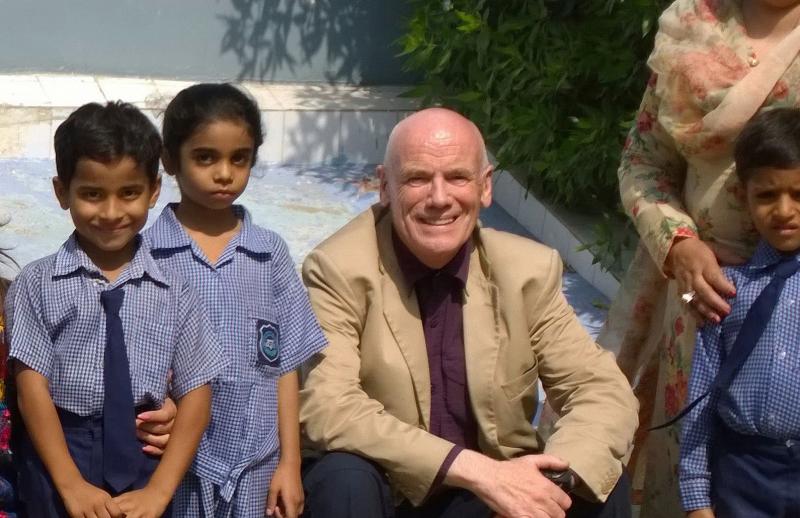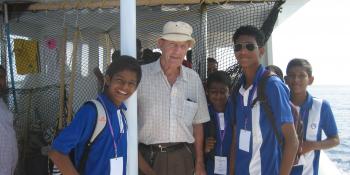In Pakistan, VSO is supporting local partners to improve the police response to gender-based violence in a country that scores among the lowest countries in the world for gender equality, and where patriarchal attitudes prevent many abused women seeking and accessing justice.
Raza* was a happy 17-year-old studying for university at Rawalpindi, in the Punjab in Pakistan, when her life changed forever.
"On Eid day, four boys raped me. After coming back at home I cried a lot. I attempted to end my life right then. I felt that there is no one with whom I can share."
Less than one in ten women worldwide who experienced violence in 2015 went to the police for help. In our gender unequal societies, women may be shamed about their abuse, and under pressure to keep quiet and maintain 'honour'.
“It’s no surprise that women see the police as a last resort”

Bill Carr, who is on his fourth VSO volunteer placement with VSO. He's currently working to strengthen an organisation that promotes better a better police response to gender-based violence.
Bill Carr is an expert in improving the effectiveness of organisations. He is working as a VSO volunteer with local partner Rozan to help strengthen the Pakistan Forum on Democratic Policing (PFPD): a group of organisations working to support and encourage the police in better serving the needs of women here.
“Women in Pakistan live in what is very much a patriarchal society. Gender-based violence is often considered acceptable. It is an immense challenge,” says Bill.
The Human Rights Commission of Pakistan recorded 987 “honour” crimes in 2015 alone. These included murder, abduction and burning. Considering the tiny fraction of GBV that is reported, it is very likely that the true number of these crimes is many times higher. One of these crimes, an acid attack, was allegedly committed by a police constable on a 19-year old, who was permanently blinded.
“It’s no surprise that the police are seen by many women as a last resort. A woman turning to the police for support after suffering domestic violence can find herself further abused, or simply held whilst her husband or family are sent for to take her home,” adds Bill.
“Police are overworked and under-resourced. They have little relevant training. In any case, they are predominantly male.”
Rozan and the PFDP are trying to change this. They lobbied for recent legislation to protect women including laws on acid attack and early child marriage. Rozan also supports individual cases, such as Raza's.
"What happened with me wasn't my fault"
In the aftermath of her rape, Raza recalled an organisation whose session about sexual abuse she had attended previously: Rozan. She called them for help.
"They supported me to report the crime and endure the medico-legal process, which was quite painful."
"Rozan has a strong relationship with the police, so one of the culprits was arrested despite the fact that I, my family and members of the police and Rozan were receiving threats. He eventually went to jail for one year."
"Throughout the process I was disturbed, felt guilty and wanted to end my life. I started taking counselling sessions from Rozan that helped me get to a normal life. I became capable of studying again because what happened with me wasn’t my fault. Today, four years later, with the grace of Allah and Rozan’s help I am running my business successfully."
An immense challenge
Rozan and the PFDP are doing great work - but they are stretched. This is where Bill, who has previously strengthened organisations in Cameroon, India and Laos as a VSO volunteer, comes in.
“I’m working to help them learn from the experiences of similar networks, and supporting with the establishment of a provincial forum in Sindh that will help more women like Raza become aware of their rights and how to access them," he says.
“The PFDP has already made real progress in supporting police in knowing and playing their part. Hopefully my work here will in a small way add to that progress.”
*Name has been changed on request
The first sexual experience of around one in three women in the world is forced. Read more stories from women who've survived gender-based violence around the world, and learn what VSO has been doing about gender-based violence in our digital feature story.
Latest posts

Transforming lives through education: Geoffrey’s VSO legacy
With a deep belief in the transformative power of education, Geoffrey from Norfolk, UK, has devoted his life both in the UK and abroad to making education more accessible for all.
